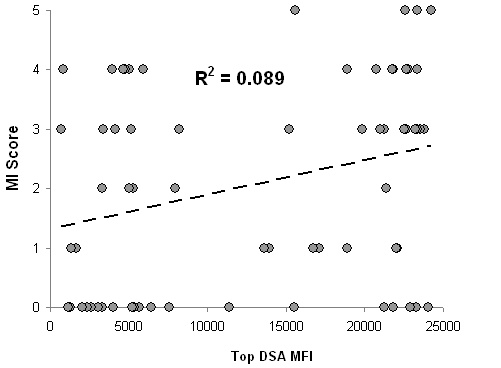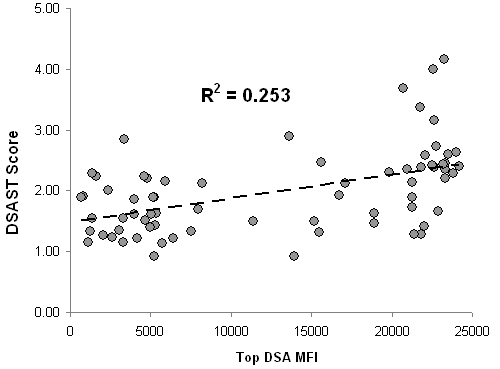DSA MFI Does Not Predict Late Antibody-Mediated Rejection Lesions Or Gene Expression Changes in Kidney Transplants
1Laboratory Medicine and Pathology, University of Alberta, Edmonton, AB, Canada
2Medicine, University of Alberta, Edmonton, AB, Canada.
Meeting: 2015 American Transplant Congress
Abstract number: 91
Keywords: Gene expression, HLA antibodies, Kidney, Reinfection
Session Information
Session Name: Concurrent Session: Kidney Antibody Mediated Rejection II
Session Type: Concurrent Session
Date: Sunday, May 3, 2015
Session Time: 4:00pm-5:30pm
 Presentation Time: 4:12pm-4:24pm
Presentation Time: 4:12pm-4:24pm
Location: Terrace I-III
BACKGROUND: It is unclear whether donor-specific HLA antibody (DSA) levels at the time of a clinically-indicated biopsy can be predictive of the degree of antibody-mediated damage. We sought to determine whether DSA MFI levels are predictive of late antibody-mediated rejection (ABMR) activity as measured by microvascular inflammation (MI) lesion scores or gene expression changes in clinically-indicated biopsies; currently the sensitive method of assessing ABMR activity.
METHODS: 70 sera positive for class II DSA and corresponding indicated renal transplant biopsies were studied. Sera were analyzed by Luminex single antigen beads (LSAB). Biopsies were scored for MI lesions using a combined score (glomerulitis+capillaritis) and compared to gene expression changes.
RESULTS: LSAB MFI values for the highest bead corresponding to a class II DSA were identified. Top bead MFI was then analyzed against MI scores in the corresponding biopsy. The correlation between the MI score and top bead DSA MFI was poor (R2=0.089)(Figure 1). We also examined the correlation between gene expression changes using DSA-selective transcripts (DSAST); a set of transcripts previously defined as being associated with biopsies from DSA+ patients. Although DSAST score and top bead DSA MFI correlated better than MI lesion scores, the correlation was only modest – R2=0.253 (Figure 2).
CONCLUSION: Our data suggest that DSA MFI levels detected at the time of a clinically indicated biopsy correlate poorly with the disease activity of ABMR in the biopsy.

To cite this abstract in AMA style:
Hidalgo L, Venner J, Halloran P. DSA MFI Does Not Predict Late Antibody-Mediated Rejection Lesions Or Gene Expression Changes in Kidney Transplants [abstract]. Am J Transplant. 2015; 15 (suppl 3). https://atcmeetingabstracts.com/abstract/dsa-mfi-does-not-predict-late-antibody-mediated-rejection-lesions-or-gene-expression-changes-in-kidney-transplants/. Accessed February 13, 2026.« Back to 2015 American Transplant Congress
